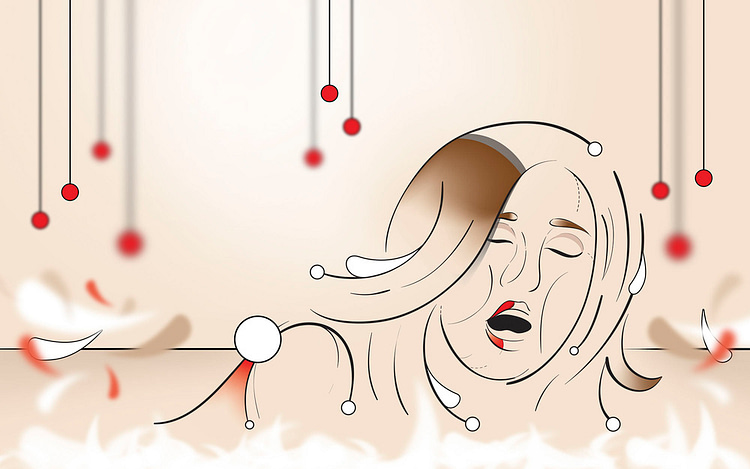7 Ways Your Mental Health Can Get in the Way of Your Orgasm

Knowledge is your power to reclaim your orgasm.
Real talk: What’s more frustrating than losing an orgasm? Not much, really. Except not even coming close to one at all.
Reaching orgasm can feel elusive for many women. Some can’t climax at all. This is normal but it’s worth determining whether there’s something getting in the way of having an orgasm.
Many of the factors that can impact your ability to have an orgasm can be treated with a little more patience and a lot more understanding about the way women’s orgasms are connected to the mind.
1. Anxiety
Anxiety is something many people have on some level on a daily basis. But there are different levels of anxiety and how they affect each person is different. For some women, anxiety might be the reason behind a difficult-to-achieve orgasm.
“Anxiety creates a lot of busy thoughts that are distracting from feelings of arousal,” says Stephanie Buehler, a psychologist and sex therapist. “Sex therapists often talk to people who have ‘performance anxiety,’ in which they’re so worried about how good they are as a lover that they can’t get turned on.”
For example, a woman might be preoccupied about how well she’s responding to her partner that she ends up losing the moment for her own orgasm.
2. Unrealistic expectations
The media can change our perception of reality for a lot of things, and believe it or not, orgasming is one of them.
What we see in movies, what we’ve read in older magazines, and especially what we see in porn has shaped the way women believe orgasms are supposed to feel, which can lead them to actually missing their own orgasms when they occur.
“Not every woman has obvious orgasms. In waiting in anticipation, they often miss their own orgasm.”
“[The media] has been guilty of telling women how orgasms are supposed to happen. It made orgasms seem like they had to be an earth-shattering, peel-you-off-the-ceiling experience that happens in multiples,” says Lawrence Siegel, clinical psychologist and sex educator.
“So, women would be waiting in anticipation for this thunderclap of an orgasm to happen… across the board for all women. But not every woman can have multiple orgasms. Not every woman has even obvious orgasms. In waiting in anticipation, they often miss their own orgasm.”
3. Body dysmorphia or body image issues
Body dysmorphia is a psychiatric disorder in which people become obsessed with a slight body imperfection or see a “flaw” in their minds that isn’t there.
It’s a condition that goes deeper than disliking a particular part of your body for whatever reason. Instead, it’s a fixation that can interfere with how you cope on a day-to-day basis. And with that, it can get in the way of reaching orgasm.
“Real distortions of body image and issues related to body image can make a person so self-conscious that they can’t get turned on,” says Buehler.
On another end of the spectrum, feeling self-conscious in general can lead to distraction and, ultimately, losing your orgasm.
“To have an orgasm you have to be able to let go and allow it to happen, which is an issue for a lot of people,” says Siegel. “People wonder if they’re pleasing their partner enough, or they get self-conscious about their own bodies in certain positions. Porn is a big misconception about how people are ‘supposed’ to look, feel, and react during sex. And a lot of that is fake.”
4. PTSD
Post-traumatic stress disorder is a severe anxiety disorder that triggers a fight-or-flight response within a person who’s experienced or witnessed a traumatic event. This can include anything from threat of injury or death, whether that’s from combat, an assault, sexual abuse, physical abuse, or other trauma.
“Any type of trauma can cause problems with any areas of sex, from desire and arousal to orgasm,” says Sandra Lindholm, a sex therapist and nurse practitioner. “The way trauma affects the brain also affects our sexuality, especially if the trauma is unprocessed.”
5. Depression and antidepressants
Depression can contribute to low libido and orgasm problems, but according to Buehler this is less common, unless, of course, you’re taking antidepressants.
“Almost any antidepressants, except Wellbutrin, can make it difficult to orgasm,” she says. “If this happens, the person should report the problem back to the prescribing physician.”
If you need to stay on your medication, Buehler recommends adding more stimulation, longer foreplay, or using a vibrator.
How do you know if there’s a physical or mental explanation?
There are several things that can get in the way of coming. One common cause, for example, could simply be that you had too many drinks, since alcohol numbs the nervous system.
But how do you know if it’s something medical?
Lindholm explains that there are a few medical conditions that can affect the orgasm. The first is conditions that affect circulation or the nervous system. There are also medications that impair arousal and orgasm. Or, it could be a major hormonal shift.
“Anything that affects circulation, such as vascular disease, heart disease, and diabetes, can deaden the orgasm,” says Lindholm. “Antidepressant medications such as Paxil, Zoloft, and Prozac, while perhaps making you feel happy, can block arousal and orgasm as well.”
So, if none of these reasons apply to you, it might be worth looking into the emotional and mental factors that could be making it more difficult to come.
Communication with your partner or a mental health professional is often the best way to get at the root of why you might be missing out on orgasms.

Meagan Drillinger is a travel and wellness writer. Her focus is on making the most out of experiential travel while maintaining a healthy lifestyle. Her writing has appeared in Thrillist, Men’s Health, Travel Weekly, and Time Out New York, among others. Visit her blog or Instagram.
(Source: www.Healthline.com)




0 Comments